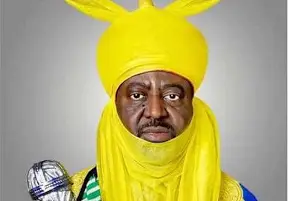
EMIRSHIP TUSSLE: ADO-BAYERO’S LAWYERS WITHDRAW LEGAL SERVICES
Mr Abdul Muhammed and other counsel to the 15th Emir of Kano, Aminu Ado-Bayero, in the ongoing Kano emirship tussle, have withdrawn their legal services before the State High Court.
The applicants in the matter—the Attorney General of Kano State, the Speaker of Kano State House of Assembly and Kano State House of Assembly, and the Kano State House of Assembly—through their counsel, Ibrahim Isah-Wangida, filed a motion ex parte on May 27, seeking the court to restrain Aminu Ado-Bayero, and four other dethroned emirs of Bichi, Rano, Gaya and Karaye from parading themselves as emirs.
The respondents are Alhaji Aminu Ado-Bayero; Alhaji Nasiru Ado-Bayero, Emir of Bichi; Dr Ibrahim Abubakar II, Emir of Karaye; Alhaji Kabiru Muhammad-Inuwa, Emir of Rano; and Alhaji Aliyu Ibrahim-Gaya, Emir of Gaya.
Others are the Inspector General of Police, Director of State Security Service, Nigeria Security and Civil Defence Corps and the Nigerian Army.
When the case came up for hearing, Muhammed, counsel to Ado-Bayero, informed the court that he had an affidavit of fact dated July 3, attached with a notice of appeal and a motion of stay of proceedings.
He urged the court to stay proceedings pending the hearing and determination of the motion at the appeal court.
“My Lord, we were served with the court processes this morning by the applicants,” he said.
He sought an adjournment to enable them to respond, but the court refused to grant his prayers.
“My Lord, myself and other counsels representing the first respondent apply for the withdrawal of our legal services and appearances,” he said.
Counsel to the 3rd, 4th and 5th respondents, Hassan Tanko-Kyaure, moved his application for an extension of time dated July 2 and counter-affidavit in response to the originating motion.
He urged the court to set aside the Kano State Emirates Council (Repeal) Law 2024, adding that due process was not followed.
Tanko-Kyaure also urged the court to dismiss the applicant’s application at a cost of N1 billion.
Counsel to the Inspector-General of Police, Mr Sunday Ekwe, told the court that he had nothing to present, adding that they left everything to the discretion of the court.
Responding as counsel to the applicant, Mr Eyitayo Fatogun urged the court to discountenance the respondent’s affidavit of facts according to Order 39 Rules 1 and 2 of the Court.
“The motion refers to a proposed notice of appeal, not a notice of appeal. It shows that the affidavit of facts is just to delay the proceedings. My Lord, the business of today is the hearing of all pending applications.”
Fatogun urged the court to dismiss the third, fourth and fifth respondents’ applications on the issue of the Kano Emirate Repeal Law because the issue is not before the court.
Earlier, while delivering a ruling, Justice Amina Adamu-Aliyu, refused the application for a stay of proceedings filed by the respondent.
“The respondent did not disclose any special fact to warrant any stay of proceedings,” Adamu-Aliyu said.
The judge adjourned the matter until July 18, to rule on the application for extension of time, notice of preliminary objection, setting aside ex parte order, joinder application, and judge to recuse herself, among others.
The court on May 27, granted an order of interim injunction restraining the 1st, 2nd, 3rd, 4th and 5th respondents themselves, servants, and privies, from parading themselves as emirs in the interest of peace in Kano.On May 23, the Kano State House of Assembly dissolved the state’s four newly created emirate councils. Gov. Abba Kabir-Yusuf reappointed Lamido Sanusi as the Emir of Kano.

